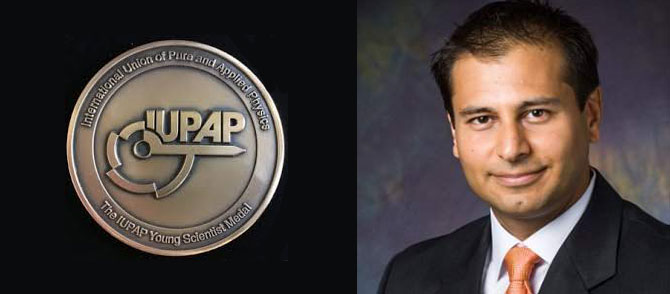EECS Alum Can Bayram Receives IUPAP Young Scientist Prize in Optics
As an honoree, he is the first awardee from the University of Illinois and only the second to be awarded such distinction from the USA.

EECS Alum Can Bayram (PhD 11') has been recognized with the Young Scientist Prize in Optics by the International Union of Pure and Applied Physics (IUPAP), for "Revolutionizing the way graphene has been employed, and making major contributions to III-V photonic devices."
The Prize will be awarded to Prof. Bayram at an upcoming major ICO meeting (TBA), where he will deliver an invited presentation. As an honoree, he is the first awardee from the University of Illinois and only the second to be awarded such distinction from the USA.
In 2005 the International Union of Pure and Applied Physics (IUPAP) created the Young Scientist Prizes for its commissions. The IUPAP prize in optics is awarded annually through ICO to a scientist who has made noteworthy contributions to applied optics and photonics during a maximum of 8 years of research experience after having earned a PhD degree.
"To be recognized in this annual world wide competition, is a clear reflection of the research excellence and wonderful academic, administrative, and scientific support my group and I have been receiving from Prof. Razeghi and her group. I would like to thank you and all CQD past and present members for their continuous support since my first day on U of I campus as a faculty. I always feel lucky to have wonderful mentor like Prof. Razeghi, who is constantly available for her students, no matter where in life her students might be", proclaimed Prof. Bayram.
Prof. Bayram received the Ph.D. degree from Prof. Manijeh Razeghi, as a member of the Center for Quantum Devices (CQD) at Northwestern University with a focus on Solid State and Photonics in 2011. His thesis work has demonstrated the first ultraviolet regime single photon detection, the first hybrid LED, and the first GaN intersubband devices. He received IEEE Electron Devices and IEEE Photonics Societies’ fellowship awards and the Laser Technology, Engineering and Applications Award from SPIE. He was an IBM and Link Foundation PhD fellow and the recipient of Boeing Engineering and Dow Sustainability Innovation awards.
Prof. Bayram then worked as a Postdoctoral Research Scientist in the Silicon Technologies Division at the IBM Thomas J. Watson Research Center, Yorktown Heights, NY, USA from 2011 till 2014. His postdoctoral work at IBM on a novel means of thin film technology achieved record-breaking specific power solar cells and was featured on the cover of Advanced Energy Materials. He has – for the first time – integrated GaN-based devices on CMOS-compatible silicon substrates. This work was highlighted as the frontispiece in the Advanced Functional Materials issue. He demonstrated direct epitaxy of GaN on Graphene for the first time, as published in Nature Communications.
Since 2014, Prof. Can Bayram has been an Assistant Professor in the Department of Electrical and Computer Engineering of University of Illinois at Urbana-Champaign. He is an expert in III-V materials and photonic and electronic devices. He has performed more than 3,000+ epitaxial growths with metalorganic chemical vapor deposition (MOCVD) systems and fabricated detectors, light emitting diodes, solar cells, resonant tunneling diodes, and transistors in class 100 and 1000 cleanrooms totaling 20,000+ hrs equipment usage. His current research interests lie in the intersection of novel III-V materials, hetero-structures, and photonic and electronic quantum devices. Particularly, his research group explores novel materials, devices, and their 3D hetero-integration on unconventional platforms such as graphene and silicon and investigates heat transport across/through semiconductors; efficiency droop mechanisms and remedies in AlInGaN emitters; and ultra-fast THz photonics/electronics.
Prof. Bayram’s work has been recognized widely. He is the recipient of the 2018 IUPAP Young Scientist Prize in Optics, 2018 IEEE Nanotechnology Council Early Career Award, a 2018 Dean’s Award for Excellence in Research for Assistant Professor, a 2018 Turkish American Scientists & Scholars Association Young Scholar Award, a 2017 NSF CAREER Award, the 2017 CS Mantech Best Student Paper Award, a 2016 AFOSR Young Investigator Award, the 2014 IEEE Electron Devices Society Early Career Award, and the Best Paper Award at the 11th International Conference on Infrared Optoelectronics.
